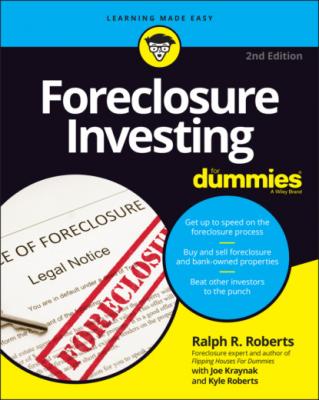ТОП просматриваемых книг сайта:
Foreclosure Investing For Dummies. Ralph R. Roberts
Читать онлайн.Название Foreclosure Investing For Dummies
Год выпуска 0
isbn 9781119861003
Автор произведения Ralph R. Roberts
Жанр Недвижимость
Издательство John Wiley & Sons Limited
That sounds like a good deal, but the investor made a huge mistake: He failed to pay off the senior lien, which I held. He could have redeemed the $25,000 senior lien that I held, sold the property for $100,000, and made a $25,000 profit, but he forgot to redeem the senior lien.
I took possession of the house and put it up for sale. The other investor called, understandably upset because he was convinced that the house was his. I had to explain that due to his oversight, the house was not in fact his, but mine.
The moral of the story is that if you buy a junior lien attempting to control the senior lien, be sure that you redeem that senior lien.
Finalizing the Foreclosure: Ushering the Previous Owners Out the Door
Eviction is an unpleasant experience for both the evictor and the evictee, so you want to do everything you can, within reason, to encourage the previous homeowners to vacate voluntarily. Offer them an incentive package — a free dumpster, use of a moving van, relocation expenses, or whatever else they need — to put this problem behind them and move on to a potentially rosier future.
If that approach doesn’t work, you have no option but to file a request with the district court to have the homeowners evicted. After you file your request, assuming that it’s approved, the sheriff’s office delivers the homeowners an eviction notice stating the date on which the eviction will occur. On that date, if the homeowners haven’t vacated the premises, the sheriff shows up to forcibly remove them and their belongings, and you formally take possession of the property.
PUTTING SOME EMPATHY IN EVICTION
I knew an investor who reveled in evictions. He would drive to the eviction site, park his red Porsche in front of the house, and make fun of the people being evicted. He even went so far as to take photographs and hang them on his office wall. The company he worked for was doing a billion dollars' worth of business annually, so maybe that fact made this cold-hearted investor feel justified, but the only real justice was what finally happened to him and all the senior management at his company: The U.S. Securities and Exchange Commission investigated its business practices and found the company guilty of several counts of mortgage fraud. The investor received a four-year sentence in a federal prison.
When you have to evict homeowners, do it with heart. Put yourself in their shoes and try to appreciate how you’d feel in a similar situation or how you’d feel if one of your family members was being evicted. If possible, rent a moving truck for the homeowners, and help them pack and load their possessions. Whatever you do, don’t cause additional pain while you’re getting your gain.
Chapter 3
Picking Your Point of Entry in the Foreclosure Process
IN THIS CHAPTER
Foreclosure investing encompasses much more than simply buying properties for pennies on the dollar at a foreclosure auction. The foreclosure process often takes three months to a year to run its course, and investors can step in at any time to scoop up a property. In fact, investors can even step in before official foreclosure proceedings begin and (in some areas) months after they wrap up.
In this chapter, I reveal the various entry points in the foreclosure process, covering everything from pre-auction to post-redemption, also known as Real Estate Owned (REO) opportunities. I point out the pros and cons of investing at each stage so that you can make a well-informed decision about where you’d like to begin your journey in foreclosure investing.
Dipping In at the Pre-Auction Stage
Homeowners often feel reluctant to take action when they first get an inkling of financial foreboding. Instead of contacting their lenders, an attorney, or a real estate agent who specializes in foreclosures to seek advice and try to work out a solution, they often stick their heads in the sand and hope the problem goes away. By the time they act, they’re usually too late. Behind on their house payments, drowning in credit card debt, and unable to pay back taxes, they sealed their fate months before the bank initiated foreclosure proceedings.
When the bank finally moves forward to foreclose, the homeowners are often in a panic. They don’t know what to do or where to go for reliable information. As a foreclosure investor, you can step into the process, provide homeowners options to cut their losses, and perhaps even help them retain possession of their property.
Exploring the pros and cons of pre-auction foreclosures
Although you can certainly wait for the foreclosure auction to roll around, the pre-auction stage offers several benefits to foreclosure investors:
Less competition from other investors.
More options for negotiating deals with homeowners and their lenders.
More time to put together a deal and close on the house.
Increased opportunity to inspect the condition of the house, inside and out.
No redemption period or other legal issues at the end that can sink the deal. When you close on the property, it’s yours. You may have to wait a week or two to take possession, depending on your agreement with the homeowners, but you don’t have to wait three months to a year for the redemption period to expire. For more about redemption, skip to the section at the end of this chapter called “Waiting Out the Redemption Period — If Necessary.”
At this point, you’re probably ready to dive into the pre-auction stage and start scooping up properties from homeowners who are eager to shed the financial burden. But before you leap, consider some of the following drawbacks of buying directly from homeowners:
Emotional fallout, including anger

